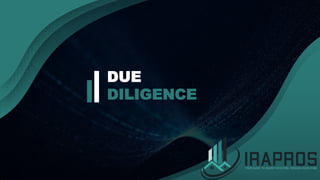Due Diligence
- 2. DUE DILIGENCE WHAT IS IT? Simply put Due Diligence is doing your homework.
- 3. ACTIVE INVESTOR An active investor will be concerned mainly with the details of the property itself. DUE DILIGENCE
- 4. ACTIVE INVESTOR ATTRIBUTES âĒ MARKET ANALYSIS âĒ PROPERTY ANALYSIS âĒ FINANCIAL ANALYSIS âĒ NEGOTIATIONS DUE DILIGENCE
- 5. PASSIVE INVESTOR An passive investor will be concerned mainly with the person they are entrusting their money to. DUE DILIGENCE
- 6. PASSIVE INVESTOR ATTRIBUTES âĒ PERSON âĒ INVESTMENT âĒ RETURN ON INVESTMENT âĒ EXIT DUE DILIGENCE
Editor's Notes
- #3: Simply put Due Diligence is doing your homework. You want to be sure you are getting a solid investment that will produce the âreturn on investmentâ that fits your goals. Think of it as if you are buying a used car. You want to be sure you are not buying a lemon right? You open the hood, inspect the interior, drive it down the road, make sure it doesnât smoke or rattle, and a host of other items. The same is true for a real estate investment. But the approach will be a different for an active investor vs a passive investor. For the active investor the focus is more on the property. For the passive investor the focus is more on the person, or the âdeal makerâ, who is facilitating the investment.
- #4: An active investor will be concerned MAINLY with the details of the property itself. They will analyze the market and/or neighborhood, rehab estimates, and re-sale or rental potential to name a few. A home inspection will be done, a title search, contractorâs estimates, and a host of other details. An active investor is essentially ensuring they are investing into a sound investment they can profit from. They make their money when they buy.
- #5: MARKET ANALYSIS NEIGHBORHOOD ANALYSIS SCHOOLS CRIME GROWTH/DEVELOPMENT DEMOGRAPHICS PROPERTY ANALYSIS HOME INSPECTION TITLE SEARCH FINANCIAL ANALYSIS PURCHASE PRICE REHAB/ARV SELL/FLIP RENT VALUE/CASH FLOW TAXES, INSURANCE, CAPITAL IMPROVEMENTS PROPERTY MANANGEMENT VACANCY NEGOTIATIONS REHAB/INSPECTION/CASH FLOW INPUT GO/NO GO DECISION
- #6: An passive investor will be concerned MAINLY with the person they are entrusting their money to. The property details are also important but are secondary to the deal maker, the person facilitating the investment. You will want to know the person better than the property. Your goal is to never see or be involved with the property so ensuring your Deal Maker is trustworthy is key.
- #7: PERSON KNOW/LIKE/TRUST PREVIOUS DEALS REFERENCES CREDIT HISTORY INVESTMENT PROPERTY DETAILS LTV RETURN INVESTMENT ANALYSIS* ROI/TERMS CASH FLOW EXIT LENGTH OF DEAL EXIT OPTIONS *SEE MY RESOURCE SECTION FOR WHAT I PROVIDE MY LENDERS âĶ.. GOES TO RETURN ON INVESTMENT TOPIC AND INVESTMENT ANALYSIS





